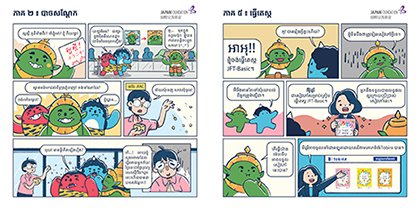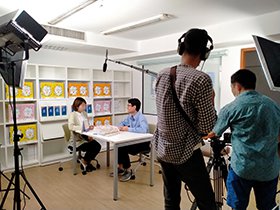“Irodori” Khmer Language Edition Published
Royal University of Phnom Penh
MATSUDA Tomoko
As of this deployment, the Japanese-Language Specialist dispatched to Royal University of Phnom Penh is concurrently undertaking duties relating to the “Japanese-Language program for foreign workers.” The main focus of that work is preparing a Japanese-language learning environment in which Cambodians hoping to travel to Japan as a “Specified Skilled Worker 1” will be able to smoothly and efficiently learn the Japanese language needed to live and work in Japan. In light of this, in addition to my duties at Royal University of Phnom Penh, I also carried out PR activities aimed at popularizing “Irodori: Japanese for Life in Japan,” The Japan Foundation’s new teaching material, and The Japan Foundation Test for Basic Japanese (JFT-Basic).
Khmer Language Edition of “Irodori: Japanese for Life in Japan” Completed
Have you heard of “Irodori: Japanese for Life in Japan” (hereinafter “Irodori”), the teaching material newly produced by The Japan Foundation? The major difference between this teaching material and “Marugoto” is that it was produced for people who will need the Japanese language for working and living from here on. The most noteworthy feature of “Irodori” is that it can be downloaded in full, free of charge. Furthermore, it has plenty of oral teaching materials, so learners who have Internet access can listen to lots of the Japanese language needed in everyday life. The Japan Foundation Asia Center, Phnom Penh Liaison Office embarked on translating “Irodori” into Khmer language as soon as it was published. Thanks to those efforts, it was possible to release all three parts of “Irodori” – Starter, Elementary 1 and Elementary 2 – in fiscal 2020. Furthermore, in response to the wishes of a large number of individuals, “Irodori” has also been turned into physical books. As a result of this, it has made “Irodori” known to a lot of Cambodians.
“Iro-Oni” Public Related Mascot Character Created
Based on my desire to make “Irodori” feel more familiar to people, I came up with three mascot characters of demons that I collectively refer to as the “Iro-Oni.” The four colors used in the letters that make up the word “Irodori” are green, red, blue and purple. Japanese demons are red and blue, but in Cambodia demons are green. And purple is The Japan Foundation’s theme color. Don’t you think this is perfect for promoting “Irodori”?
I am utilizing the “Iro-Oni” in a variety of settings, but one area where they are flourishing in particular is in a manga (comics), which I release regularly on Facebook. The cute “Iro-Oni” characters teach Japanese lifestyle tips in the Khmer language. I am planning to continue steadily publishing this manga in the future too.

The “Iro-Oni” public relations mascot characters for “Irodori”
“Irodori” Skit Produced
Based on my desire to create teaching materials that will be useful to them even in a small way, I produced a skit for “Irodori.” Skits are also called short plays, but they make it possible to learn a language in a format that resembles watching a drama. The actors who took part in filming the skit were students from Royal University of Phnom Penh and people associated with The Japan Foundation. They had no experience as actors, but all of them remembered their lines diligently and performed their roles convincingly. I am hoping this skit will prove useful to a large number of Japanese-language learners.

Filming the “Irodori” skit
Online Classes Held at Royal University of Phnom Penh for the First Time
2020 was a tough year for universities around the world, and Royal University of Phnom Penh also closed from March 2020, with classes mostly held online for the year. Holding classes online was a first for both the Japanese-language teachers and the students. As a result, initially both sides fumbled ahead and the online classes got off to a somewhat flustered start. However, the students were very hardy and appear to have grown accustomed to online classes in no time. However, one thing that has proven problematic is that they all turned their cameras off, which makes it difficult to see their reactions. Furthermore, when heavy rain falls, it makes Internet connections unstable and sometimes even I – the teacher – lose the connection and end up exiting online meetings. Additionally, previously, when I took a simple survey, I found that most students are taking classes on their smartphones. It appears the ownership rate for PCs is still not very high in Cambodia. It reminded me of the need to design my classes while keeping in mind that they must also be “classes that students can comfortably participate in even on a small smartphone screen.” Online classes look set to continue for some time. I intend to push steadily ahead, starting with what can be done first.
- What We Do Top
- Arts and Cultural Exchange [Culture]
- Japanese-Language Education Overseas [Language]
- Japanese-Language Education Overseas [Language] Top
- Learn Japanese-language
- Teach Japanese-language
- Take Japanese-Language Test
- Know about Japanese-language education abroad
- The Japanese-Language Institute, Urawa
- The Japanese-Language Institute, Kansai
- Japanese-Language Programs for Foreign Specified Skilled Worker Candidates
- Japanese Language Education for Japanese Children Resident Overseas and for the Descendants of Migrants
- Archives
- Japanese Studies and Global Partnerships [Dialogue]
- JF digital collection
- Other Programs / Programs to Commemorate Exchange Year
- Awards and Prizes
- Publications
